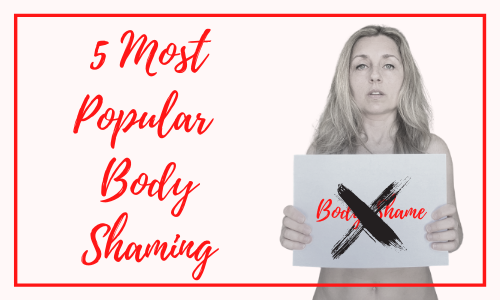Throughout history, people have always shamed others for how their bodies looked. But in a world where you do not even have to show your face to do so, but can just hide behind a fake persona online, it has become even crueler.
Body Shaming means the derision of someone’s physical appearance and can have serious emotional effects, including low self-esteem, eating disorders, anxiety, body dysmorphia, and even depression. Through pop culture and the media, we are influenced by what is considered attractive from an early age onwards. Even movies specifically designed for children carry messages like “You have to look a certain way in order to be (socially) successful and liked.” Here below you can read and understand more about the 5 most popular body shaming:
1. Fat Shaming
 Obesity can be caused by bad habits such as eating fatty foods and too much, not exercising, not taking care of your body whatsoever. So yes, one can become overweight through an unhealthy lifestyle. However, there are many more causes of obesity that many never even consider before fat-shaming someone else. Genetics, medications, and diseases such as hypothyroidism or insulin resistance can be the source of overweight. So, instead of condemning someone for the size of their body, we should figure out the causes and support healthiness.
Obesity can be caused by bad habits such as eating fatty foods and too much, not exercising, not taking care of your body whatsoever. So yes, one can become overweight through an unhealthy lifestyle. However, there are many more causes of obesity that many never even consider before fat-shaming someone else. Genetics, medications, and diseases such as hypothyroidism or insulin resistance can be the source of overweight. So, instead of condemning someone for the size of their body, we should figure out the causes and support healthiness.
2. Shaming for Thinness
 On the other end of the spectrum, we find shaming for skinniness. There are different possible root causes for extreme thinness. One can be an eating disorder equalling mental health issues in which case the person affected needs to receive help rather than bullying, as this will just worsen their inner struggles and create even more pressure. Extreme thinness can also be a side effect of severe chronic diseases like cancer. This is called cachexia and is a sign that the patient is already in the late stages of the disease. In dementia patients, we also see that they stop eating at the end of their life.
On the other end of the spectrum, we find shaming for skinniness. There are different possible root causes for extreme thinness. One can be an eating disorder equalling mental health issues in which case the person affected needs to receive help rather than bullying, as this will just worsen their inner struggles and create even more pressure. Extreme thinness can also be a side effect of severe chronic diseases like cancer. This is called cachexia and is a sign that the patient is already in the late stages of the disease. In dementia patients, we also see that they stop eating at the end of their life.
3. Height-Shaming
 Whether one is very short or extremely tall, one might experience height-shaming and be criticised and made fun of for something they have no control over whatsoever. Interestingly, being tall is sometimes depicted as awkward amongst children and teens, but amongst adults, height is typically valued, depending on your sex and gender. Whereas women are harassed for being tall, men are shamed for being short as we still carry this ideal of a heterosexual couple where the man is taller than the woman, instead of celebrating love in all forms, shapes, and sizes.
Whether one is very short or extremely tall, one might experience height-shaming and be criticised and made fun of for something they have no control over whatsoever. Interestingly, being tall is sometimes depicted as awkward amongst children and teens, but amongst adults, height is typically valued, depending on your sex and gender. Whereas women are harassed for being tall, men are shamed for being short as we still carry this ideal of a heterosexual couple where the man is taller than the woman, instead of celebrating love in all forms, shapes, and sizes.
4. Shaming of Hairiness (or lack thereof)
 Shaming of hairiness is a rather gender-specific kind of bullying, as women will typically be judged for not shaving their legs or armpits or having facial hair, whereas men are often made fun of for hair loss and going bold. Interestingly, there are big industries massively benefitting from hair removal solutions as well as hair transplants and hair growth products. On top of this, preferences regarding grooming are highly subjective. Every person has the right to choose how to dress, how to present themselves, and how to groom their body. And their taste might highly differ from yours. Diversity is what makes the world more colourful.
Shaming of hairiness is a rather gender-specific kind of bullying, as women will typically be judged for not shaving their legs or armpits or having facial hair, whereas men are often made fun of for hair loss and going bold. Interestingly, there are big industries massively benefitting from hair removal solutions as well as hair transplants and hair growth products. On top of this, preferences regarding grooming are highly subjective. Every person has the right to choose how to dress, how to present themselves, and how to groom their body. And their taste might highly differ from yours. Diversity is what makes the world more colourful.
5. Shaming of skin conditions
 The skin is our biggest organ. Keeping this in mind, it only makes sense that it is prone to diseases. Skin disorders like psoriasis are not just painful and itchy and can lead to infection through scratching, but can also be a cause of mockery as they can affect and cover large areas of the body. In the case of psoriasis, the immune system mistakingly starts attacking healthy skin cells. Just like with eating disorders added stress only worsens the condition creating a vicious circle if the person affected is being bullied. Rather than judging affected people, we should be kind and show some sympathy.
The skin is our biggest organ. Keeping this in mind, it only makes sense that it is prone to diseases. Skin disorders like psoriasis are not just painful and itchy and can lead to infection through scratching, but can also be a cause of mockery as they can affect and cover large areas of the body. In the case of psoriasis, the immune system mistakingly starts attacking healthy skin cells. Just like with eating disorders added stress only worsens the condition creating a vicious circle if the person affected is being bullied. Rather than judging affected people, we should be kind and show some sympathy.
One great way to improve your self-esteem and overcome insecurities regarding your physical appearance is by practicing Naked Yoga. In my classes, I create a safe space for everyone to come as they are and to practice acceptance towards yourself and others. Sign up for my “live” online classes here. Speaking from personal experience, I know the struggle with a body that does not fit your expectations of how it should look, be and work, but throughout regular practices of self-acceptance, and taking it step-by-step, you can heal your relationship with your body and become whole again. It is not about how your body looks, but about how you treat it. And how you treat yourself determines how others treat you. Do not let others walk all over you, but rather set clear boundaries. Together we can stop the body shame.


Recent Comments